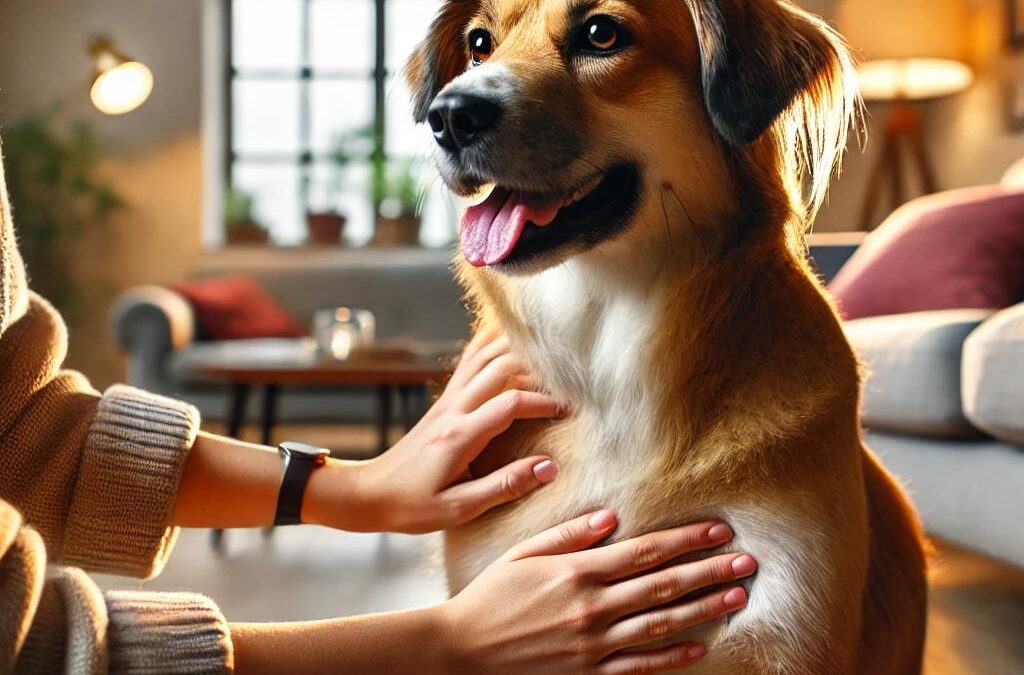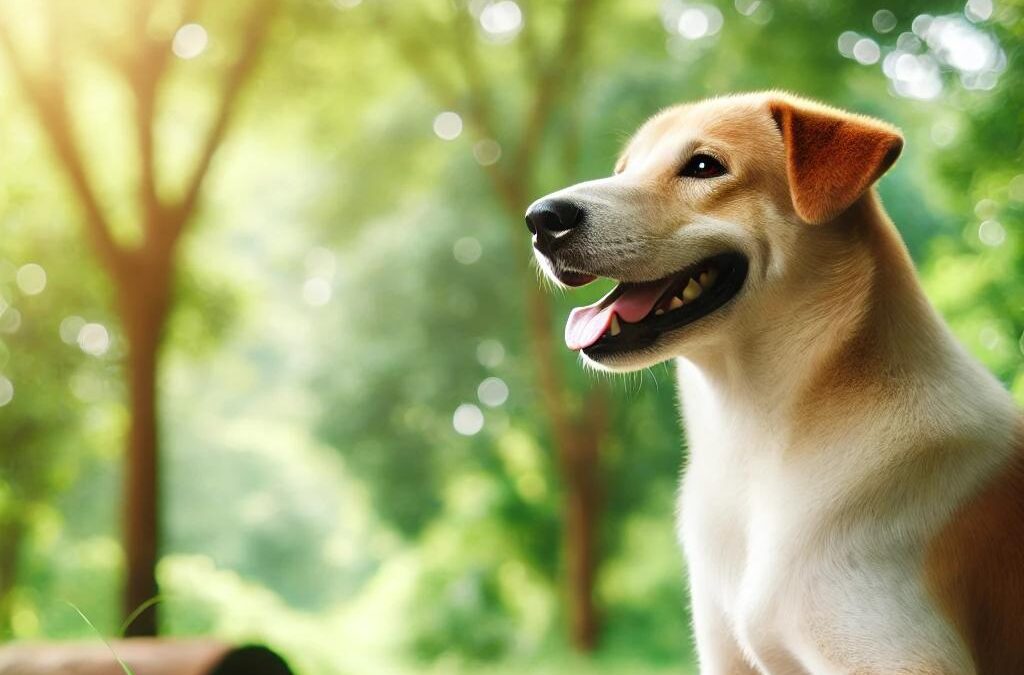
by TCMVET | Oct 14, 2024 | Dog Cancer & Tumors
Ear tumors in dogs can develop in any part of the ear, from the outer pinna to the deeper sections of the ear canal and inner ear. While some ear tumors are benign and grow slowly without spreading, others are malignant and require immediate medical attention. Understanding the signs of ear tumors and knowing what to watch for can help you catch any issues early and improve your dog’s chances of successful treatment.
What Are Ear Tumors?
Ear tumors refer to abnormal growths that appear in or around a dog’s ear. Not all tumors are cancerous, but they should still be closely monitored and evaluated by a veterinarian. Ear cancer is a specific type of ear tumor that is malignant, meaning it grows aggressively and may spread to other parts of the body. Tumors in the ear can affect the pinna (outer ear), the ear canal, the middle ear, and even the inner ear.
Common Areas Where Ear Tumors Develop
- Pinna (Outer Ear)
The pinna, or outer flap of the ear, is more commonly affected by ear tumors, especially in dogs with droopy ears or ears that are exposed to the sun for long periods. Tumors here are often easier to detect during grooming or petting.
- External Ear Canal
The external ear canal is the passage leading into the ear that contains both a vertical and horizontal section. Tumors here may cause symptoms like head shaking, scratching, or visible swelling.
- Middle Ear
The middle ear, located behind the eardrum, contains small bones that transmit sound. Tumors in this area can affect a dog’s hearing and balance, causing more serious symptoms like head tilting or difficulty walking.
- Inner Ear
The inner ear controls hearing and balance. While tumors in this region are rare, they can cause severe balance issues and neurological symptoms if they occur.
Signs and Symptoms of Ear Tumors in Dogs
It’s important for pet owners to recognize the signs of ear tumors early. Common symptoms include:
- Head shaking or scratching: Persistent head shaking or pawing at the ear may indicate irritation caused by a tumor.
- Discharge or foul smell: Tumors can lead to an infection, causing foul-smelling discharge from the ear.
- Visible lumps or swelling: Growths on the pinna or near the ear canal can be seen or felt, especially during grooming.
- Hearing loss: Tumors affecting the ear canal or middle ear can block sound, leading to partial or complete hearing loss.
- Balance issues: If a tumor affects the inner ear, your dog may experience problems with balance, such as wobbling or falling.
Diagnosing Ear Tumors in Dogs
If you notice any unusual symptoms in your dog’s ears, it’s important to consult a veterinarian as soon as possible. Your vet may perform a physical exam, imaging tests (such as X-rays or CT scans), and a biopsy to determine whether the tumor is benign or malignant. Early diagnosis can help ensure the best treatment options are available.
Treatment Options
Treatment for ear tumors depends on whether the tumor is benign or malignant:
- Benign tumors can often be surgically removed if they are causing discomfort or obstructing the ear canal.
- Malignant tumors may require more aggressive treatment, including surgery, radiation therapy, or chemotherapy. In severe cases, partial or full removal of the affected ear may be necessary to prevent the spread of cancer.
Ear tumors in dogs, whether benign or malignant, should never be ignored. Regularly check your dog’s ears for any lumps, swelling, or unusual symptoms. If you notice any changes in your dog’s behavior or ear health, contact your veterinarian for a thorough evaluation. Early detection is key to improving outcomes, especially for malignant ear tumors.

by TCMVET | Oct 14, 2024 | Dog Cancer & Tumors
Veterinarians are highly trained to spot abnormalities in your dog or cat, and regular veterinary check-ups are essential for catching serious health issues, such as cancer. However, most pets only visit the vet once or twice a year, leaving gaps in monitoring. As a pet owner, you can play an active role in your pet’s health by performing routine at-home checks to detect potential signs of cancer early.
The Importance of At-Home Health Checks for Pets
While annual vet visits are crucial, you are in the best position to notice subtle changes in your pet’s health. By incorporating monthly at-home health checks into your routine, you can spot lumps, weight changes, and other signs of illness before they become more serious. Early detection can lead to earlier treatment, giving your pet a better chance at a positive outcome.
How to Check for Lumps and Bumps
One of the easiest and most important things you can do during an at-home check is to feel for lumps and bumps. Run your hands slowly over your pet’s entire body, paying special attention to the chest, belly, and limbs. Don’t forget to check between the toes and under the armpits. For female pets, make sure to inspect the nipples and surrounding tissues for any lumps or swelling, as mammary tumors are common in dogs and cats.
Monitoring Weight and Body Condition
Weight loss or gain can be a subtle sign of cancer in pets. Run your hands along your pet’s rib cage to feel for any unusual changes in body condition. You should be able to feel your pet’s ribs without pressing too hard, but they shouldn’t be overly prominent. To monitor weight trends more accurately, weigh your pet monthly and keep a log. This allows you to spot gradual changes that might otherwise go unnoticed.
Oral Health Checks
Your pet’s mouth can reveal a lot about their overall health. Regularly look inside your pet’s mouth to check their teeth, gums, and tongue. Lift the lips to inspect the gum line and teeth for any unusual growths, discoloration, or bleeding. To make this process easier, offer a treat and let your pet lick it while you check the top and bottom of the tongue for any abnormal lumps or sores.
The Role of Pet Owners in Cancer Detection
You know your pet better than anyone else, and by incorporating monthly at-home health checks, you increase the likelihood of catching any subtle signs of cancer early. If you detect anything unusual, such as a new lump, unexplained weight loss, or abnormal behavior, schedule a visit with your veterinarian for further evaluation.
Regular at-home health checks can be a powerful tool in detecting early signs of cancer in pets. By staying proactive and monitoring your pet’s health closely, you can catch potential issues before they worsen. Along with annual veterinary exams, these routine checks give your pet the best chance at maintaining a healthy, happy life.

by TCMVET | Oct 14, 2024 | Dog Cancer & Tumors
Cancer is a leading cause of death in pets, but many of its early warning signs are easy to miss. Unlike obvious symptoms such as weight loss or large lumps, subtle indicators often go unnoticed by pet parents, which can delay diagnosis and treatment. Being aware of these subtle signs could make all the difference in detecting cancer early and improving your pet’s prognosis.
Common Yet Overlooked Signs of Cancer in Pets
- Changes in Eating Habits
If your pet suddenly becomes a picky eater or shows a drastic change in appetite, it may be an early sign of cancer. Tumors affecting the gastrointestinal system, mouth, or throat can cause discomfort or difficulty eating. Even if your pet seems to just prefer certain foods over others, it’s important to monitor their eating patterns closely.
- Lethargy and Unexplained Fatigue
A sudden lack of energy or reluctance to engage in regular activities can be an early sign of cancer. While many pet owners may attribute this to aging, persistent fatigue, or reduced activity levels can indicate underlying health issues, including cancer.
- Unusual Lumps or Swellings
Not all lumps are easily noticeable, especially in pets with thick fur. Swellings that develop under the skin or in hard-to-reach areas (such as between the toes or on the tail) may go unnoticed. Regularly checking your pet’s body for unusual growths is crucial.
- Weight Loss or Gain
Unexpected weight loss can be one of the clearest signs of cancer in pets. However, some pet parents may overlook this symptom, especially in long-haired pets where weight changes are less obvious. On the flip side, certain tumors can lead to fluid retention, resulting in sudden weight gain.
- Persistent Coughing or Difficulty Breathing
A chronic cough, especially one that doesn’t seem to be associated with respiratory infections, can be a subtle sign of cancer, particularly lung cancer. If your pet develops labored breathing or has a dry, unproductive cough, it’s important to get a veterinary evaluation.
- Changes in Bathroom Habits
Cancer in the digestive system or bladder can cause changes in a pet’s bathroom habits. Look for persistent diarrhea, constipation, blood in the stool, or difficulty urinating. These changes might be subtle, but they could indicate a more serious underlying condition.
- Bad Breath or Oral Discomfort
While bad breath in pets is often associated with dental disease, it can also be a sign of oral tumors. If your pet shows signs of mouth pain, excessive drooling, or bleeding gums, it’s worth investigating further to rule out the possibility of cancer.
- Wounds That Won’t Heal
If your pet has sores or wounds that take an unusually long time to heal, it could be a sign of cancer. Persistent wounds or infections may be the result of a weakened immune system caused by the disease.
- Behavioral Changes
If your normally friendly and social pet becomes withdrawn, irritable, or aggressive, it could be a sign of discomfort or pain. Behavioral changes may be an early indicator of internal issues, including cancer.
Why Early Detection Matters
Detecting cancer in pets early can significantly improve treatment options and outcomes. Regular check-ups and routine monitoring of your pet’s health are key to catching potential warning signs before the disease progresses. If you notice any of these subtle changes in your pet, it’s essential to consult your veterinarian for further examination and testing.
Many pet parents overlook subtle signs of cancer in their pets, often attributing changes to aging or minor health issues. By staying vigilant and paying attention to small changes in behavior, appetite, or physical condition, you can help ensure early detection and treatment of cancer, potentially saving your pet’s life.

by TCMVET | Oct 14, 2024 | Dog Cancer & Tumors
A dog’s paws are often overlooked when it comes to routine checkups, but they can be the site of various types of growths and tumors. Tumors or unusual lumps on a dog’s paw can be a cause for concern and should be evaluated by a veterinarian to ensure your pet’s health. Regularly inspecting your dog’s paws can help catch these issues early, preventing discomfort and potential complications.
Types of Tumors Commonly Found on Dog Paws
Several types of growths may develop on a dog’s paw, ranging from benign to malignant. These include:
- Melanoma: One of the more serious forms of tumors, melanomas often appear black and are frequently found around the nail bed. These tumors can spread to other areas of the body, making early detection critical.
- Mast Cell Tumors: These growths can be pink or red and may appear ulcerated or raw. Mast cell tumors can vary in severity, from benign to highly aggressive forms, so any new lump should be checked by a vet.
- Squamous Cell Carcinoma: This type of cancer commonly affects the area between the toes and can resemble a wart or scab. Although these tumors tend to grow slowly, they can still invade nearby tissues, so prompt treatment is important.
- Benign Growths: Not all growths on a dog’s paw are cancerous. Warts or cysts are relatively common and generally harmless, but should still be examined to rule out more serious issues.
Signs to Watch for on Your Dog’s Paws
If you regularly inspect your dog’s paws, you’ll be better able to detect changes early. Here are some signs that may indicate a tumor or other growth on your dog’s paw:
- Swollen areas or lumps between the toes
- Nail abnormalities, such as discoloration or deformation
- Pain or sensitivity when the paw is touched
- Limping or reluctance to walk
- Visible sores, bleeding, or discharge
Why Veterinary Attention Is Crucial
While some lumps may seem harmless, it’s always better to err on the side of caution when it comes to your dog’s health. A veterinarian can perform a biopsy or other tests to determine whether a growth is benign or malignant. Early detection and diagnosis can lead to more effective treatment options, potentially saving your dog from unnecessary pain or more serious health risks.
Treatment Options
Treatment for paw tumors can vary depending on the diagnosis. For benign growths, your veterinarian may recommend monitoring or simple removal. Malignant tumors, on the other hand, may require more aggressive treatment such as surgery, chemotherapy, or radiation therapy. In some cases, if the tumor has spread or is causing significant damage, amputation of the affected area might be considered to prevent further complications.
Regularly checking your dog’s paws is a simple yet effective way to keep your pet healthy and comfortable. If you notice any new lumps or unusual growths, it’s essential to have them evaluated by a veterinarian. Early detection and treatment can improve outcomes and help ensure your dog enjoys a long, happy life.

by TCMVET | Oct 13, 2024 | Dog Cancer & Tumors
Throat tumors in dogs, affecting areas like the larynx, pharynx, and tonsils, can have a significant impact on a dog’s ability to eat, breathe, and vocalize. Whether benign or malignant, these tumors require early recognition and prompt veterinary care to manage symptoms and improve your dog’s quality of life. In this article, we’ll discuss the early signs of throat tumors in dogs, treatment options, and how natural care methods can complement conventional therapies for optimal health.
What Are Throat Tumors in Dogs?
Throat tumors can develop in different parts of a dog’s throat, including the larynx (voice box), pharynx (upper throat), and tonsils. They may be benign (non-cancerous) or malignant (cancerous), with malignant tumors posing a greater threat due to their potential to spread.
The common types of throat tumors in dogs include:
- Laryngeal Tumors: These tumors grow on the vocal cords or surrounding tissue, potentially affecting a dog’s ability to bark or make sounds.
- Pharyngeal Tumors: Located in the upper throat, these tumors can obstruct the airway, causing breathing difficulties.
- Tonsillar Tumors: These tumors are often malignant and can cause swallowing issues, excessive drooling, and discomfort.
Early Signs of Throat Tumors in Dogs
The symptoms of throat tumors can vary based on the location and size of the tumor. Early detection is crucial, so watch for the following warning signs:
- Voice Changes
If you notice that your dog’s bark or vocalizations sound different (hoarse, quieter, or strained), it could be a sign of a laryngeal tumor affecting the vocal cords.
- Coughing or Gagging
Persistent coughing or gagging, especially during or after eating, may indicate a pharyngeal or tonsillar tumor that is blocking the airway or irritating the throat.
- Difficulty Swallowing
Dogs with throat tumors may have trouble swallowing food or water, often leading to drooling, choking, or regurgitation. This is especially common with tonsillar tumors.
- Labored Breathing
Throat tumors can obstruct the airway, leading to noisy or labored breathing. This is a serious symptom that requires immediate veterinary attention.
- Lumps or Swelling
In some cases, you may feel or see lumps around the dog’s throat area, or your dog may react with pain when you touch their neck.
Treatment Options for Throat Tumors in Dogs
The treatment approach depends on the type, size, and location of the tumor, as well as whether it is benign or malignant. Common treatment methods include:
- Surgery
For accessible tumors, surgery is often the first option. Removing the tumor can relieve symptoms and, in many cases, provide a cure, particularly if the tumor is benign or localized.
- Radiation Therapy
Radiation is used for malignant tumors that cannot be fully removed through surgery. It helps shrink the tumor and alleviate symptoms such as difficulty breathing or swallowing.
- Chemotherapy
For dogs with metastatic (spreading) or inoperable tumors, chemotherapy may be used to slow tumor growth and prolong the dog’s life.
- Palliative Care
For advanced-stage cancer, palliative care can help manage pain and discomfort. Medications, dietary changes, and supportive care can make your dog more comfortable.
Natural Care Options to Support Your Dog’s Health
While conventional treatments are essential, natural care options can help support your dog’s recovery and overall well-being. Always consult with your veterinarian before introducing natural remedies, especially if your dog is undergoing medical treatments.
- Herbal Supplements for Inflammation and Healing
Certain herbs can help reduce inflammation, support the immune system, and promote healing in dogs with throat tumors.
- Turmeric: Turmeric is a powerful anti-inflammatory herb that can help manage pain and swelling in dogs. It is often used to support dogs with cancer or chronic inflammation.
- Reishi Mushrooms: Reishi mushrooms are known for their immune-boosting and anti-cancer properties. They may help slow tumor growth and improve overall health.
- Licorice Root: Licorice root has soothing properties and can help reduce throat irritation and inflammation, especially in dogs with respiratory symptoms.
- Dietary Adjustments
Ensuring that your dog receives proper nutrition is crucial when managing a throat tumor. Soft, easy-to-swallow foods can help prevent discomfort during meals.
- Wet Food: Switching to wet or blended food can make eating easier for dogs with swallowing difficulties. You can also moisten dry food to make it more palatable.
- Bone Broth: Rich in nutrients and easy to consume, bone broth can provide extra hydration and nourishment for dogs that struggle with solid food.
- Hydration and Comfort
Make sure your dog stays hydrated by offering fresh water throughout the day. Some dogs may benefit from using a raised bowl to make swallowing easier. Keeping your dog calm and stress-free is also important, as stress can exacerbate breathing difficulties.
- Aromatherapy for Relaxation
Aromatherapy can help calm anxious dogs, particularly those dealing with discomfort from a throat tumor. Essential oils like lavender or chamomile (used in a diffuser) can promote relaxation and a sense of peace.
Throat tumors in dogs require early diagnosis and treatment to improve your pet’s quality of life. By recognizing the symptoms and seeking prompt veterinary care, you can address the condition before it worsens. Combining conventional treatments with natural care methods, such as herbal supplements and dietary adjustments, can help support your dog’s health during their recovery. Always consult your veterinarian before implementing any new treatments to ensure the best outcome for your dog.

by TCMVET | Oct 13, 2024 | Dog Cancer & Tumors
Tumors in dogs, particularly mast cell tumors, can grow large, become ulcerated, and burst. This rupture is not only distressing for both dogs and their owners but also presents a serious risk of infection due to the open wound. Immediate medical attention is essential to prevent complications. In addition to conventional veterinary treatment, Traditional Chinese Medicine (TCM) offers natural remedies that may support the healing process, reduce inflammation, and improve your dog’s overall well-being. In this article, we will discuss the causes of tumor ruptures, steps for immediate care, and how TCM herbs can aid in recovery.
Why Do Tumors Burst in Dogs?
Tumors such as mast cell tumors, squamous cell carcinomas, and other cancerous growths in dogs often have fragile blood vessels. Over time, as the tumor enlarges and its surface ulcerates, the risk of rupture increases. Key factors contributing to tumor rupture include:
- Trauma or Pressure
Dogs may accidentally scratch, bump, or rub the tumor, causing it to rupture.
- Internal Pressure
As tumors grow, they can exert pressure on the surrounding tissue and blood vessels, causing them to burst.
- Natural Tissue Breakdown
Tumors can outgrow their blood supply, leading to tissue death (necrosis) and ulceration. This weakens the structure of the tumor and can cause it to burst.
Immediate Care for Burst Tumors
A burst tumor needs to be treated quickly to prevent infection and further complications. Here’s what you can do:
- Clean the Area
Gently clean the affected area with sterile saline or clean water to remove debris and blood. Avoid using alcohol or hydrogen peroxide, as they can damage the tissue.
- Control Bleeding
Apply gentle pressure using sterile gauze or a clean cloth to stop the bleeding. If the bleeding does not stop after a few minutes, contact your veterinarian immediately.
- Bandage the Wound
After cleaning the wound, cover it with a clean, non-stick bandage to protect the area from dirt and bacteria.
- Visit the Veterinarian
A burst tumor requires professional veterinary care. Your vet will likely prescribe antibiotics to prevent infection, pain relief, and possibly suggest surgery to remove the tumor.
How Traditional Chinese Medicine (TCM) Can Help
Traditional Chinese Medicine offers holistic treatments that can complement conventional veterinary care for dogs with cancer. TCM herbs are known to promote healing, reduce inflammation, and support the immune system, which can be especially beneficial for dogs recovering from a burst tumor. Here are some commonly used herbs:
- Honeysuckle (Jin Yin Hua)
Honeysuckle has strong anti-inflammatory and antibacterial properties. It is used in TCM to clear heat and toxins from the body, which can help reduce the risk of infection in dogs with open wounds.
- Szechuan Lovage (Chuan Xiong)
Szechuan lovage is known for its ability to promote blood circulation and relieve pain. This can help reduce discomfort and prevent blood stagnation around the tumor site.
- Scrophularia (Xuanshen)
Scrophularia is effective in reducing lumps and tumors. Its cooling properties help decrease inflammation and can aid in healing open wounds, making it particularly useful for dogs with ulcerated or burst tumors.
- Astragalus (Huang Qi)
Astragalus is used to boost the immune system and improve overall vitality. It can support the body’s natural defenses, helping your dog fight off infection and recover more quickly.
Preventing Future Tumor Ruptures
While it may not always be possible to prevent tumor ruptures, there are steps you can take to minimize the risk:
- Monitor the Tumor
Regularly check your dog’s tumor for signs of growth, ulceration, or other changes. Early intervention can prevent a tumor from reaching the point of rupture.
- Reduce Physical Activity
If your dog’s tumor is in a vulnerable location, limit their physical activity to prevent accidental trauma.
- Protect the Tumor Site
If the tumor is in an area where it is likely to be bumped or scratched, your vet may recommend covering the site with a protective bandage.
- Consider Herbal Support
In addition to conventional care, TCM herbs like those mentioned above can help reduce the risk of further complications by promoting healing and reducing inflammation.
Dealing with a burst tumor in your dog is a stressful experience, but with prompt veterinary care and the support of Traditional Chinese Medicine, you can help your dog recover and maintain their quality of life. TCM herbs such as honeysuckle, Szechuan lovage, and astragalus offer natural ways to reduce inflammation, support healing, and boost your dog’s immune system, complementing conventional cancer treatments. Always consult your veterinarian before incorporating any herbal treatments into your dog’s care plan to ensure safety and effectiveness.






